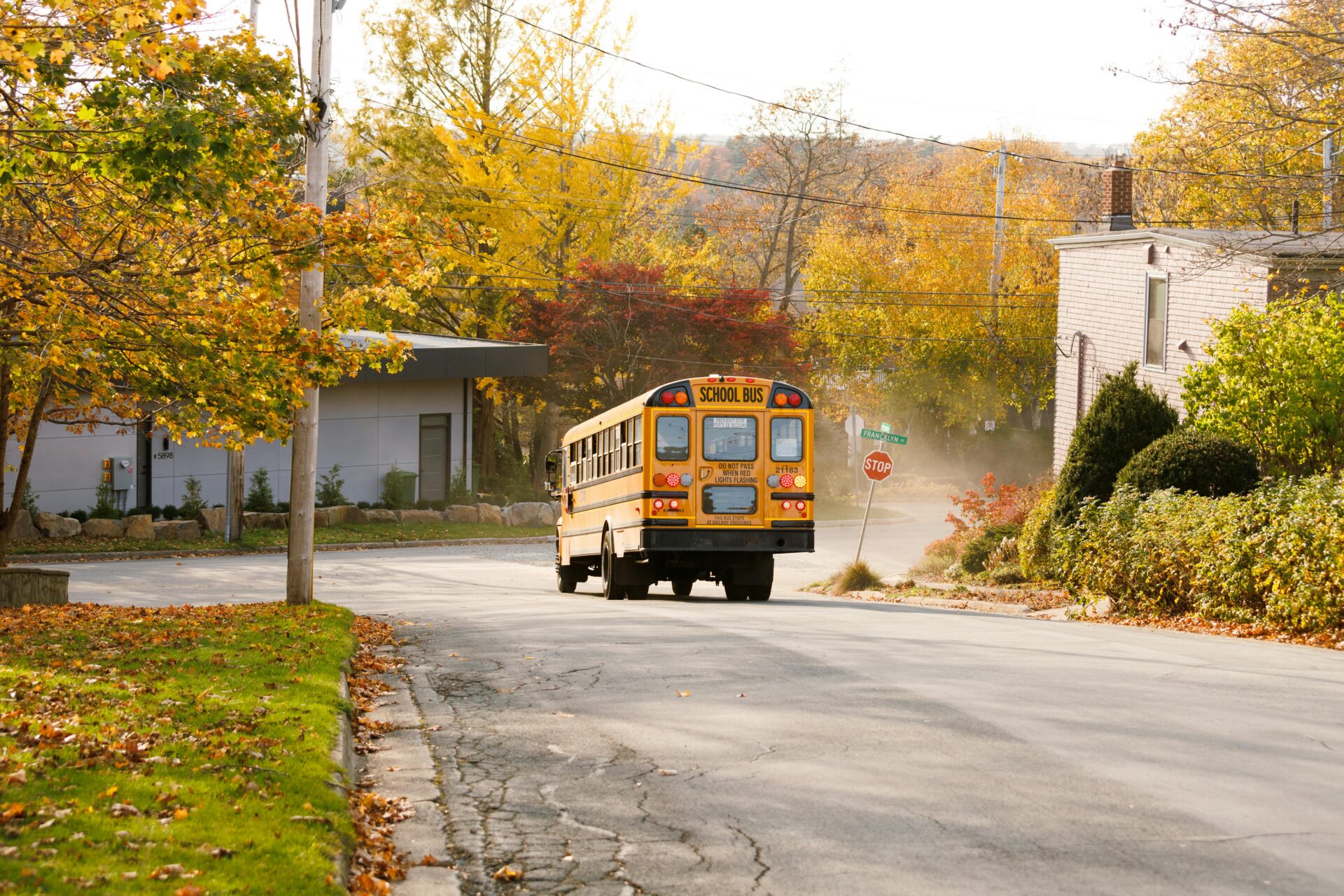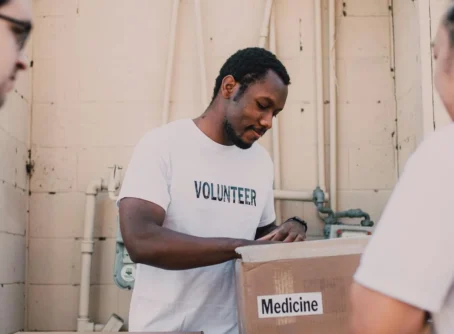
This article part of our series looking at the Invisible Social Safety Net — all of those houses of worship and faith-based organizations that provide essential social services to their communities, sometimes with the help of government funding and sometimes without that assistance. In order to unleash the power of the social safety net to support our most vulnerable neighbors, CPJ advocates for state, local, and federal governments who need to understand how to partner with and support these “invisible” links who serve not because they have to by law, but because faithfulness to their tradition calls them to serve.
A child suspended from riding the school bus. A parent working two jobs. A home without internet. To the families of Villagebrook Apartments in Carol Stream, IL these barriers to opportunity occur all too frequently. Although children in these apartments spend approximately 1,000 hours in school every year, they are often vulnerable to academic and social challenges, if they do not have access to the educational, familial, and communal support they need.
Fortunately, in Carol Stream there is a network of faith-based organizations (FBOs) that is able to provide that support. The work of faith-based nonprofits in Carol Stream is a microcosm of what we see across the country: namely, churches and FBOs providing educational, social, and community support. Although FBOs often receive less funding and attention than federal or internationally recognized programs, collaborative efforts between FBOs and houses of worship can directly and significantly improve the prospects of vulnerable youth.
As demand for after school services in the U.S. continues to rise, providing affordable and tangible solutions for communities like Villagebrook Apartments becomes an increasingly crucial task for local FBOs and church congregations alike. I volunteered at Villagebrook as a tutor for a time and have had a privilege to see the impact FBOs have been able to have for children in the community.
The Demand for After School Programs
Unmet demand for after school programs across the U.S. reached an all-time high this decade. A 2020 study by Afterschool Alliance found that nearly 25 million U.S. families would like to enroll their children in a school-sponsored or external after school program but cannot due to lack of access or availability. Indeed, it is the triad of poverty, uncertainty, and inaccessibility rather than indifference that makes so many families seek out but never enroll in an after school program.
An impoverished household’s lack of physical resources–such as nutritious food, stable
internet, or access to supplies–can make completing schoolwork at home difficult for children.
Recognizing the academic and social benefits a child may secure between 3:00 pm and 6:00 pm causes program demand among parents to rise, while circumstantial reality prohibits many of those parents from enrolling their children. This cyclical reality is felt most severely by Black and Hispanic families, who, despite demonstrating great interest in after school programs, cite the lack of effective transport, inadequate attention, and inconvenient location and hours as the most significant barriers to participating in them.
It is these challenging circumstances that make after school programs so attractive and so necessary for low-income families. Studies such as NASSP’s 2020 review have shown that poverty significantly and negatively affects academic achievement and social opportunity among children. An impoverished household’s lack of physical resources — such as nutritious food, stable internet, or access to supplies — can make completing schoolwork at home difficult for children. Similarly, parents of impoverished households may work long hours or multiple jobs, rendering them unavailable for their children’s academic and social needs. Even school districts located in high-poverty regions often lack resources necessary to provide students with adequate or additional academic guidance.
The consequences of such limitations are more significant than a simple failing grade. Across the board, inadequate educational support predicts higher crime involvement among both children and adolescents. With fewer resources and attention comes less student engagement and a greater risk of academic and social disadvantage. Lacking proper opportunities and stimulation in the classroom and at the end of the school day, students are statistically more likely to engage in chronic truant behavior, drop out before completing high school, and realize less postsecondary and/or professional success.
Alternative Opportunities
Conversely, high quality after school programs offer children crucial opportunities for growth that might otherwise remain unmet. These opportunities include fostering positive relationships between children and mentors, constructing positive relationships among program participants, offering academic and socio-behavioral skill building activities, promoting high levels of engagement, and providing appropriate guidelines that encourage structure while allowing for constructive autonomy. As a result, school attendance, grades, and academic work habits among participating children are positively affected. By providing participants with academic and social support, after school programs enable children to hone their capabilities, mature academically and cognitively, and flourish during a pivotal period in their lives and beyond.
An Essential Suburban Program
Outreach, a faith-based organization in the suburbs of Chicago has long stood as a champion of underserved and marginalized communities. Established in 1973, Outreach exists, officially, “To restore hope and provide opportunities for people to become all that God intends them to be.” Rooted in a desire to serve the vulnerable, Outreach has been promoting the inherent dignity and value of at-risk families and children in Carol Stream, IL and beyond for decades.
One of Outreach’s many programs is the Jubilee Neighborhood School program (JNS). JNS offers affordable after school opportunities for 1st through 5th grade students, supporting academic achievement and introducing children to positive adult role models. The program’s impact is perhaps most immediately felt at its satellite campus, located at Carol Stream’s Villagebrook Apartments. Here, participating children living in the complex receive an hour of one-on-one after school tutoring twice a week from local volunteers. During that hour, students eat snacks, complete their homework, and review multiplication tables, all while receiving undivided adult attention that may otherwise be missing from their day. The hour of productive attention also assists many Villagebrook parents, who work multiple jobs or long hours and thus are not able to provide socially and educationally productive spaces for their children at home.
The child has said nothing about her home situation and the tutor has offered no professional guidance, but a meaningful connection has nevertheless been established between the two.
The Villagebrook tutoring program is simple, direct and lasts only a few hours per week. What, then, makes it so impactful? Mindy Inman, Outreach’s Director of Volunteer Services, offers a valuable perspective. “The way [children] come to understand themselves,” Inman explains, “is first in their family and second [in] how they do in school.” When a child’s primary and secondary sources of identity are simultaneously compromised — when a child struggles in math class as her single mother works a 12-hour shift, for example — a daily recognition of her self-worth becomes difficult to achieve.
When such a child enters the Villagebrook classroom, she is warmly welcomed by an individual similar in age to her mother whose ostensive objective is to help her with the fractions she needs to learn. For the next hour, this child is invited to tell stories, ask questions, and simply be herself. At the end of the hour, her homework is finished, her tutor praises her work ethic — and her apartment is only a short walk away. The child has said nothing about her home situation and the tutor has offered no professional guidance, but a meaningful connection has nevertheless been established between the two.
Forging A Dynamic Partnership
A deep desire for building meaningful connections first drew Illinois Pastor Kyle Haack and the congregation of Wheaton Christian Reformed Church (CRC) to Villagebrook 12 years ago. “Before we act on behalf of another,” Haack shared, “we need to listen to them and know them.” Since 2012, volunteer tutors from the Wheaton CRC congregation have traveled to the Villagebrook complex every Tuesday evening to do just that. Whether reading out loud, playing board games, or simply listening to stories, Wheaton CRC volunteers have worked alongside Outreach to develop meaningful relationships with the children of Villagebrook and prompt them towards personal and academic growth.
Although chances to explicitly share the gospel at Villagebrook are limited — Outreach’s contract with the complex prohibits its staff and volunteers from initiating religious conversations with the children — both Outreach and Wheaton CRC view the restrictions as an opportunity. “We may not get to use words,” admits Haack, “but by showing our love for these children and sticking with them year after year, we are exhibiting God’s love and perseverance to them.” Vanessa Roth, Outreach’s Chief Operating Officer, agrees: “Our model is to share the gospel in word and deed…when you spend an hour a week tutoring a kid and they are dying to see you when you come in the next time, you’ve connected…and they won’t forget you.” FBOs like Outreach are motivated to serve members of their community because of their faith, which calls them to love their neighbors.
Outreach staff at Villagebrook have witnessed the power of these relationships expand beyond the apartment classroom, as well. Dina Hilliard, Outreach’s Executive Director for Carol Stream, recalled the story of a young boy who had been suspended from riding the school bus for ten days. When the school brushed aside the concerns of the student’s mother — whose job schedule made driving her son to school herself impossible — Outreach staff took turns driving the boy to and from school until the suspension had been lifted.
Haack affirmed a similar development in Wheaton CRC’s presence in Carol Stream, highlighting the church’s eight-week summer program held on the complex grounds. “Fun in the Park” exposes the city’s children to new experiences, such as rock climbing and model rocket building, while providing their working parents with an affordable and nurturing childcare option during the out-of-school months. The program additionally enables the church’s volunteers to stay in contact with their Villagebrook tutees in between school years, further strengthening the relationships established over vocabulary sheets and dice games. These collaborations showcase the role FBOs and churches play in the flourishing of civil society; that partnership maximizes its full potential when FBOs and churches unite to better care for their communities.
Work That Matters
Connections like those fostered by Outreach and Wheaton CRC’s partnership at Villagebrook not only improve a child’s academic and developmental prospects. They are also a powerful and practical demonstration of Christ’s love for the unempowered and underserved.
Indeed, it is the practical and cooperative nature of the partnership between Outreach and Wheaton CRC that makes the Villagebrook program so effective, and an important reminder that such organizations play a vital role in the invisible social safety net. As Christians, our pursuit of public justice must include supporting children and their academic and developmental needs. When the congregation of Wheaton CRC first began tutoring at Villagebrook 12 years ago, it did so understanding that this calling would most successfully be realized through humble collaboration with an FBO. Similarly, when Outreach chose to welcome Wheaton CRC into the JNS program, it did so knowing the significant influence churches have in their communities. Through such mutual discernment, Outreach and Wheaton CRC are able to reach a particular group in a particular setting for a particular purpose–and to do so effectively.
Indeed, it is the practical and cooperative nature of the partnership between Outreach and
Wheaton CRC that makes the Villagebrook program so effective.
From addition and subtraction to Battleship and comic books, the activities pursued at Outreach’s Villagebrook tutoring program may appear ordinary and inconsequential at first. However, by stepping into the lives of at-opportunity children and parents in such a tangible way, Outreach and Wheaton CRC manifest Christ’s love in their communities and empower young people to find success in school and society alike. With the skills developed in these tutoring sessions, children who may otherwise slip through the social safety net unnoticed are instead embraced by the invisible social safety net where they are reminded of their worth, their uniqueness, and their capacity for flourishing.
In Matthew 19:14, Jesus says, “Let the little children come to me, and do not hinder them, for the kingdom of heaven belongs to such as these.” To remind the children of Villagebrook of their worth and capabilities, as Outreach and Wheaton CRC so beautifully do every week, is to be Christ’s hands and feet in Carol Stream. It is to remind children that they are valued beyond their imagination, regardless of the difficulties they face at home or in school. It is, ultimately, to remind the — through every flashcard practiced, every game played, and every conversation held — that they, too, deserve the opportunity to succeed; organizations like Outreach and Wheaton CRC help reinforce this beautiful reality and give them the support they need.
Garrett Ellis is a senior at Wheaton College studying International Relations and Spanish. He previously worked as an Advocacy Intern at the Center for Public Justice.





